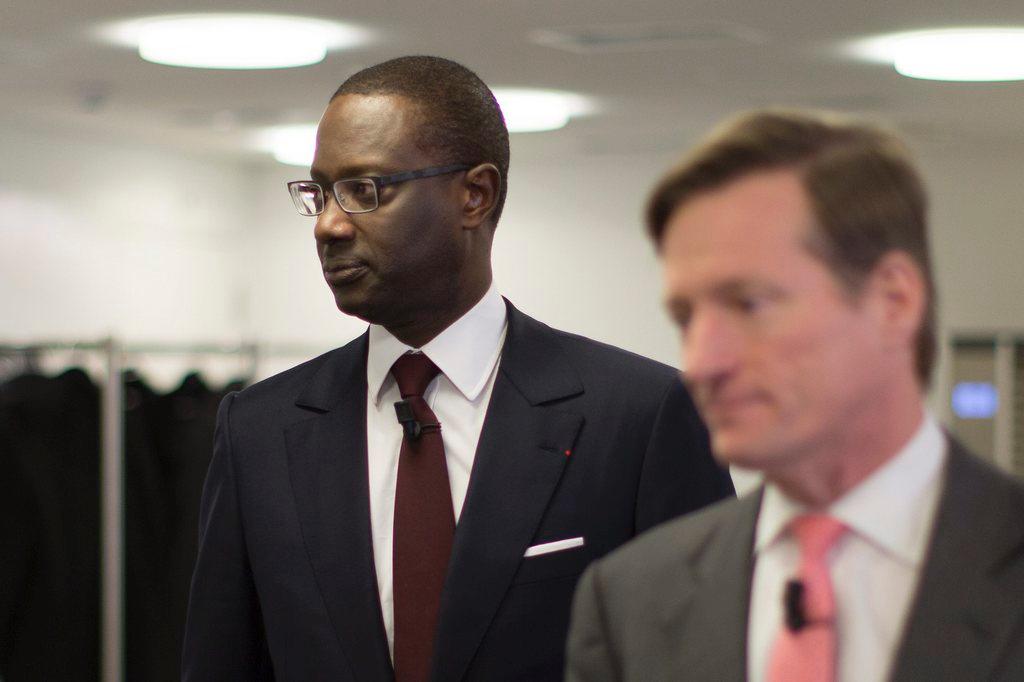Reputation risk drives Credit Suisse strategy

Switzerland’s second-biggest bank is getting back to what it has done best in a bid to restore investor confidence by reshaping its business and boosting profitability. In a word, it’s about credibility.
Faced with plunging core profits, Credit Suisse is embarking on a major overhaul to transform one of the world’s largest investment banks into a leading private bank and wealth manager.
To accomplish that, the bank said on WednesdayExternal link that it would raise more than CHF6 billion ($6.3 billion) in capital by selling stock and cutting CHF3.5 billion in costs, including 1,600 Swiss jobs, by the end of 2018. It also plans to expand operations in Asia and emerging markets, particularly for their growing ranks of newly rich entrepreneurs.
This is an attempt to “right-size” the investment bank so that it mainly provides services to wealth management. Part of the pressure comes from the new and costlier regulatory world that all global banks must navigate in the wake of the global financial crisis.
The decision outlined by Credit Suisse’s new CEO Tidjane Thiam conforms to the views of banking experts who believe the Zurich-based bank should reinvest in its core business of managing money for wealthy people and institutions.
Traditionally, Credit Suisse has been strong in its private and institutional wealth management. The global lender will now emphasise that with investment banking in a supporting role. Part of its Swiss banking operations will be publicly listed.
“It makes sense for an institution which wants to be credible as a manager of private and institutional wealth to downsize the investment bank and to put the knowledge of the investment bank at the service of wealth management,” Martin Brown, a professor of banking at the University of St GallenExternal link, told swissinfo.ch.
Reputational challenges
Thiam, who took over at Credit Suisse on July 1, faces an uphill battle turning around the bank’s 24% drop in core profits and a 9% decline in revenues in the third quarter, which he blamed on difficult market conditions. Its biggest and most important market remains the United States.

More
Credit Suisse: capital fix
“It emphasises the need to change the business model,” he told investors, describing the new strategy as a shift towards becoming “a leading private bank and wealth manager with strong investment banking capabilities”.
“Why do we like wealth management? Because wealth management is growing,” added Thiam, the former chief executive at British insurer Prudential. “There is clearly an opportunity there and it is significant.”
Urs Rohner, the board chairman, told investors the new strategy and plans would “focus on our strengths” and on high-returning businesses, while cutting costs and raising capital.
The bank said it would cut 1,500-2,000 jobs in Britain, 1,600 in Switzerland and 2,000 in the United States, mostly through attrition, but would expand some other operations with new hiring.
Since the global financial crisis, investment banks have been under increased pressure from low interest rates and new regulatory demands to raise their capital cushions. Meeting those demands reduces what is available for investing.
Credit Suisse has only a 10.3% capital position, compared with 14.4% at its crosstown rival, UBS, Switzerland’s biggest bank. Credit Suisse and UBS are among the top global banks considered “too big to fail”External link.
De-linking the risks
Some recent studies, such as one with German banks, have shown negative effects of investment banking on wealth management clients. Credit Suisse’s strategy seeks to reduce risk-weighted assets that could harm investors.
That is not only a response to tougher regulations for investment banking. It reflects what experts describe as a growing realisation of the huge reputational risks in the wake of the global financial crisis and the US-led legal crackdowns on Swiss banking secrecy.
“Thiam was brought into the bank as CEO to downsize the investment bank, grow in Asia and better control costs,” said banking analyst Dirk Becker of Kepler Cheuvreux. “He is delivering on all these expectations with the strategy announcement, but there is no tangible breakthrough on top of it.”
The investment bank at Credit Suisse accounts for about half of the bank’s assets. UBS already downsized its investment bank in a similar measure aimed at focusing on wealth management. That helped raise share prices by more than a third since two years ago.
The reason? Risky investments can undermine a bank’s credibility, prompting some wealthy clients and institutions to head for the exits. The US investigation into UBS, as part of efforts to cut off Americans’ use of offshore accounts to dodge US taxes, led to a $780 million (CHF745 million) fine and the disclosure of thousands of American account holders, many of whom were later prosecuted.
“My assessment is that after the financial crisis, it’s become much harder to convince the wealth management clients that the bank can serve them well and at the same time run a fully fledged investment bank,” Brown said.
Credit Suisse, which agreed to a $2.6 billion plea bargain last year External linkto resolve allegations it helped wealthy Americans cheat on their taxes, has emphasised the strong synergies that can exist between investment banking and wealth management.
To that end, Thiam emphasised that knowledge from successful investing will support the services that help private clients make money. But by de-emphasising the investment banking, Credit Suisse can reduce potential conflicts of interest.
“What the financial crisis and developments since then have shown is that while those synergies may exist, there are also conflicts of interest between those two business units,” said Brown. “When banks like UBS or Credit Suisse have losses like they did in the financial crisis, this reduces confidence among the wealth management clients in the whole bank.”
“It’s basically like saying you’re running a very safe business but in the same building on the first floor you’re running a casino at the same time,” he added. “Anything that goes wrong in the casino will damage the reputation of the full bank.”
Too big to fail
On October 21, the Swiss cabinet announced UBS and Credit Suisse must hold capital equal to 5% of assets to boost their resilience and protect taxpayers in the event they need to be wound down.
The new requirement must be met by the end of 2019, the government said in a statement.
The leverage ratio, as the measure of financial strength is known, can include a maximum of 1.5% of contingent convertible bonds.
In order for the bonds to count toward the ratio, they must convert into equity or get written down if the bank’s risk-weighted equity ratio falls below 7%, according to a separate statement from Swiss financial regulator FINMA. Bonds that fulfil this requirement are known as high-trigger or “going-concern capital”.
Both banks had been lobbying against the higher leverage ratio. The same day, Credit Suisse announced a capital increase as part of an overhaul that will help the bank comply with the requirements.
Finance Minister Eveline Widmer-Schlumpf said the new rules would give the big Swiss banks an advantage over the international competition and would make it easier for them to attract foreign clients.
Thomas Jordan, president of the Swiss National Bank, said Switzerland was maintaining its pioneering role in solving the “too-big-to-fail” problem. This was also necessary, he added, because system-relevant banks in Switzerland were very large in proportion to the economy.

In compliance with the JTI standards
More: SWI swissinfo.ch certified by the Journalism Trust Initiative












You can find an overview of ongoing debates with our journalists here . Please join us!
If you want to start a conversation about a topic raised in this article or want to report factual errors, email us at english@swissinfo.ch.